
My fate
Carolyn Muir Helfenstein (BIS ’13) reflects on her life’s journey from Newfoundland at the age of 6, to an Ontario farm wife, newspaper editor, author and 73-year-old university graduate.

Carolyn Muir Helfenstein (BIS ’13) reflects on her life’s journey from Newfoundland at the age of 6, to an Ontario farm wife, newspaper editor, author and 73-year-old university graduate.
By Carolyn Muir Helfenstein AlumnusI knew I was just a woman, but it was a pivotal moment in my new life.
Those were the very early days of women’s rights on farms, in the 1970s. Yet that day I had been empowered. Up one row of corn and down the next I guided the Massey tractor that pulled our corn harvester, edging closer towards those tall, ripe corn stalks, their leaves waving at me in the brisk October breeze, welcoming me, even as that threatening beast approached them. Didn’t they know? But that day each stalk succumbed, chewed by the fiendish teeth of our harvester; blown into the waiting wagon—until at day’s end, as I looked across the field those stalks were all gone.
Fate had won.
That was 50 years ago.
I am eighty-three years old now, have been married to my first love for 62 years and it’s time to reflect. Was it my Fate to remain just a Newfoundlander turned farm wife, one who could drive a tractor?
No. Not really.
I recall turning to freelance writing. The publisher asked me, “Would you like to buy my paper?” New doors opened wide. Like harvesting corn —we followed the lives of the community we served. Up one row and down the next. We covered the death of a baby left in the woods to die. We joined 40,000 farmers converging on Ottawa. We placed smiling faces on the cover of Belonging—our special section featuring men and women who had been released from institutions, having been harboured there for years, many from childhood, safely it was assumed, but legally returned. Our feature stories in Belonging, of their successful home coming, won a first prize in Ontario that year.
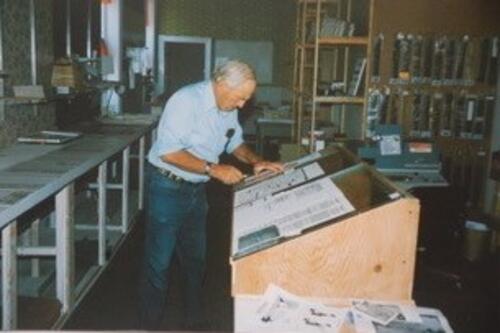
Carolyn's husband Harry lays out an issue of the newspaper at their office in Teeswater, ON.
Sadly, like many rural community newspapers, ours eventually failed. Nevertheless, our efforts are now archived for others to ponder in the years to come — in the Bruce County Museum.
Was Fate winning?
No, not yet.
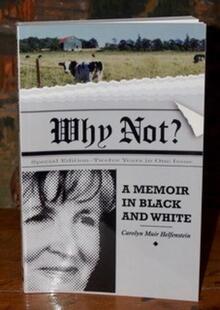 But I was depressed. I turned to Harry, who else? I needed to write. Do it, he said. He saw a twinkle in my eye. Up one row and down the next, chapter by chapter, those 12 years we’d spent recording the life and times of our small town became my first published book. I called it Why Not? A review by Ronald Mackay began: this book contributes to Canadian history.
But I was depressed. I turned to Harry, who else? I needed to write. Do it, he said. He saw a twinkle in my eye. Up one row and down the next, chapter by chapter, those 12 years we’d spent recording the life and times of our small town became my first published book. I called it Why Not? A review by Ronald Mackay began: this book contributes to Canadian history.
Was that my Fate? To have one book published by a Newfoundland farm girl who once drove a tractor and ran a newspaper with her husband?
No, not yet.
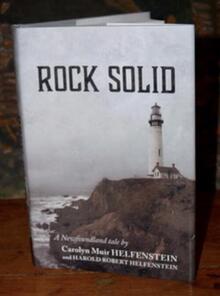 I experienced an epiphany. The message was clear. My Newfoundland identity was demanding to be recognized. I was accepted into one of University of Waterloo’s last independent studies programs. Dr. Anne Dagg, my guardian angel. I researched and travelled back home to St John’s, dug deep, Newfoundland characters emerged, chapter by chapter, up one row and down the next. I learned who I was: tough, determined, rough around the edges, not always lady-like, but my lifetime gave me the manna from heaven to graduate and write Rock Solid, an honest book. My thesis had been In Search of an Identity. Today, Rock Solid rests smugly, I might suggest, with other Newfoundland novels, in the archives of the Folklore Department of Memorial University in Newfoundland.
I experienced an epiphany. The message was clear. My Newfoundland identity was demanding to be recognized. I was accepted into one of University of Waterloo’s last independent studies programs. Dr. Anne Dagg, my guardian angel. I researched and travelled back home to St John’s, dug deep, Newfoundland characters emerged, chapter by chapter, up one row and down the next. I learned who I was: tough, determined, rough around the edges, not always lady-like, but my lifetime gave me the manna from heaven to graduate and write Rock Solid, an honest book. My thesis had been In Search of an Identity. Today, Rock Solid rests smugly, I might suggest, with other Newfoundland novels, in the archives of the Folklore Department of Memorial University in Newfoundland.
Is there another door to open?
Well, maybe.
At age 17, Carolyn Muir Helfenstein stepped into the work force and became a teacher in a one-room schoolhouse on the 6th Con. King Township. It was 1955. She taught six, then five grades. Next came Toronto Teachers’ College and she received the highest academic standing at gradu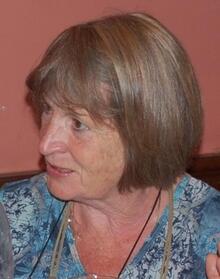 ation. After that came marriage, further teaching and her greatest joy, family. But graduating from Waterloo at age 73 was “a high point” in her professional life.
ation. After that came marriage, further teaching and her greatest joy, family. But graduating from Waterloo at age 73 was “a high point” in her professional life.
Carolyn is aware there are many senior women—and yes, men—in their 70s and 80s who enjoy participation and acknowledgement. Yet, on the whole, she says “their wisdom, their knowledge, and the special mountains they’ve climbed are sadly ignored. It takes a lot of determination and grit to step out. But watch a baby take her first step. That’s the same feeling I enjoyed when I was asked to write this piece.”

Read more
Children's book author Nadia Hohn (BA '01) shares how she turned her creative outlet into a career, and the role she plays in diversifying our bookshelves

Read more
Happy International Women’s Day! Meet 7 Waterloo alumni who have broken down gender-based barriers.
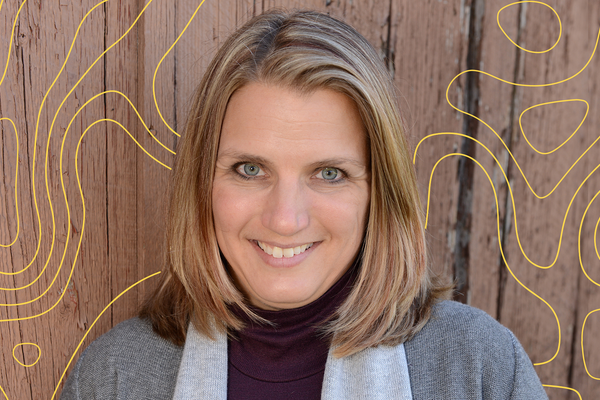
Read more
Author Carolyn Mills (BA '00) shares an inside look at the writing and publishing process
The University of Waterloo acknowledges that much of our work takes place on the traditional territory of the Neutral, Anishinaabeg, and Haudenosaunee peoples. Our main campus is situated on the Haldimand Tract, the land granted to the Six Nations that includes six miles on each side of the Grand River. Our active work toward reconciliation takes place across our campuses through research, learning, teaching, and community building, and is co-ordinated within the Office of Indigenous Relations.